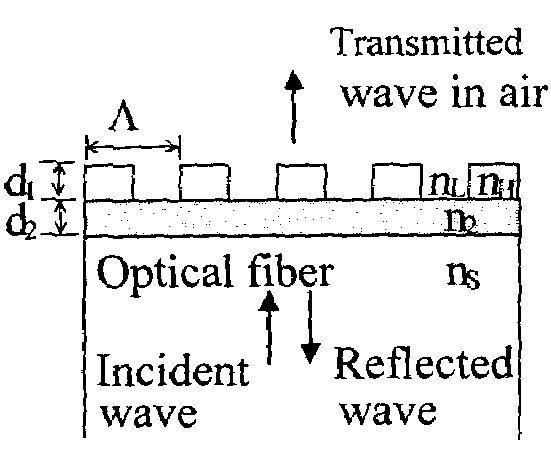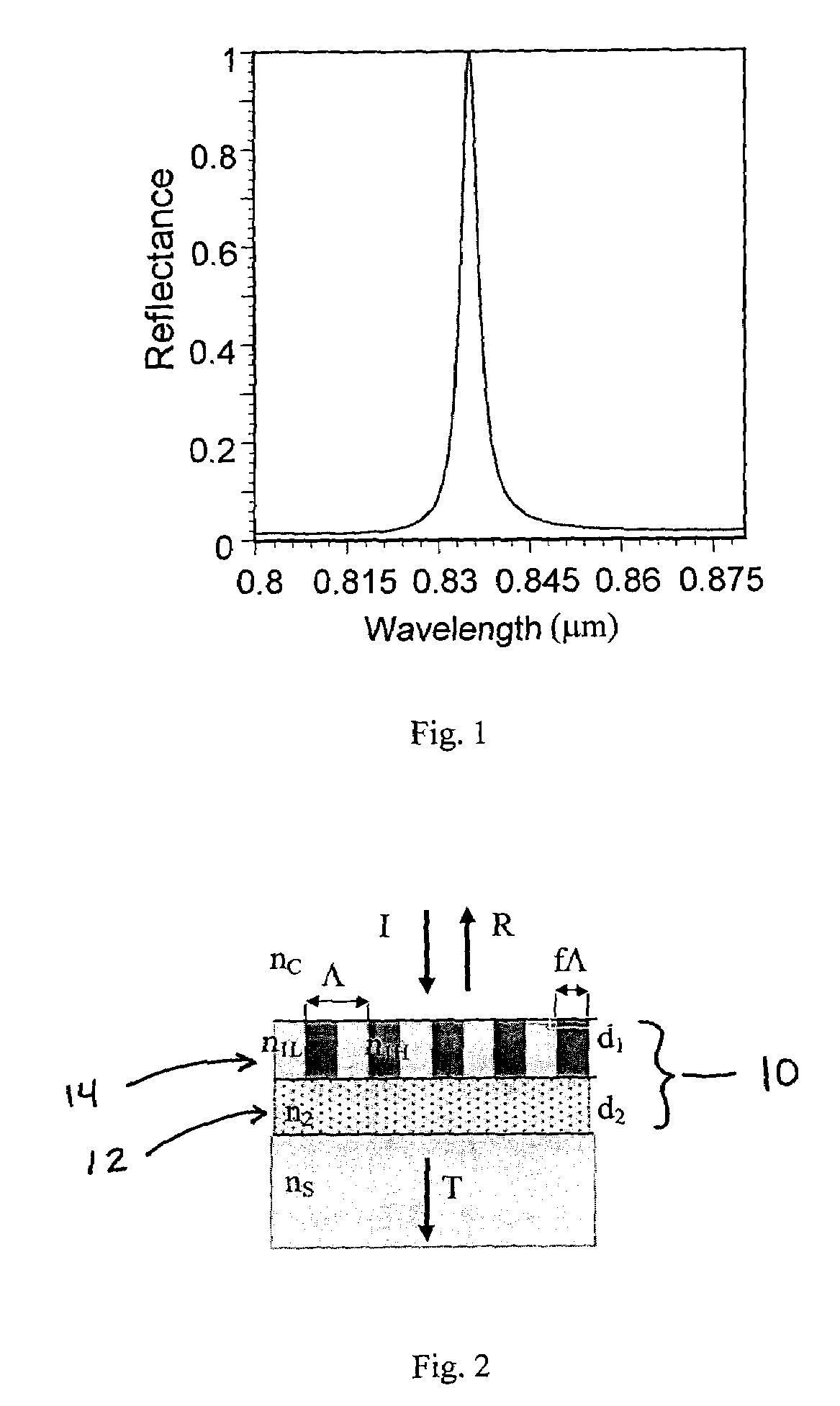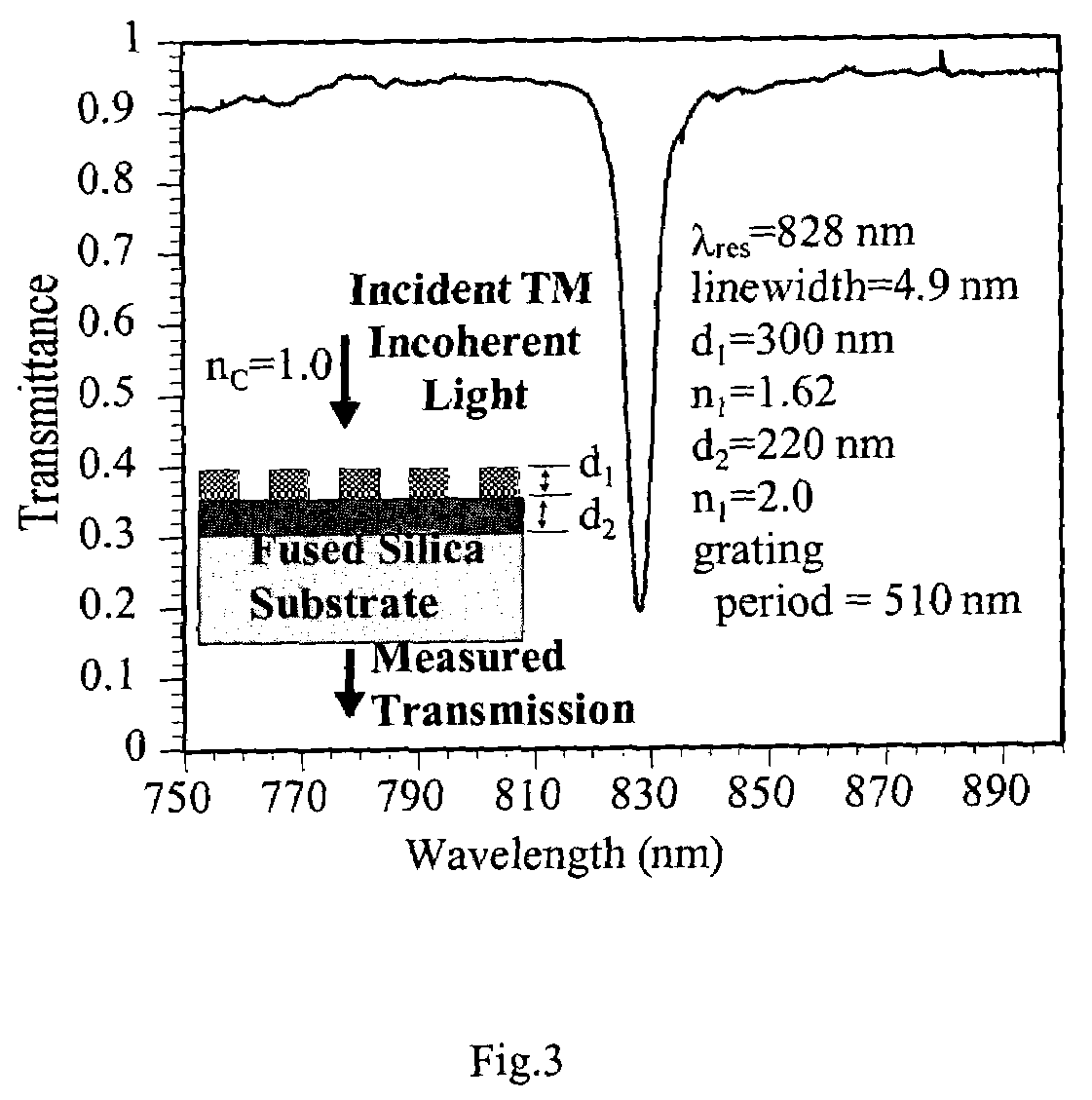Resonant waveguide-grating filters and sensors and methods for making and using same
a filter and waveguide technology, applied in the field of optical filters and sensors, can solve the problem that the substance to be sensed may not attach efficiently to dielectric materials
- Summary
- Abstract
- Description
- Claims
- Application Information
AI Technical Summary
Benefits of technology
Problems solved by technology
Method used
Image
Examples
example 1
[0083]Example 1 describes a procedure that was undertaken to optimize the manner of fabricating a diffractive grating, but not a waveguide grating, on the endface of a fiber. A high quality cleaving tool was used to obtain flat, optical quality endfaces on both single-mode and multimode fibers. After cleaving, the fibers were visually inspected with an optical microscope to determine endface quality. The fibers were cleaned by immersion in an ultrasonic bath of heated acetone for 30 minutes, briefly dipped in optical grade methanol, and dried with filtered nitrogen gas.
[0084]The fabrication procedure was initially optimized by recording efficient submicron diffractive structures on the optical fiber endfaces. Thin films of UV-sensitive Shipley 1805 photoresist (PR) were deposited on the cleaved multimode and single-mode fiber endfaces by a dipping process. It was found that a dilution of 3 parts PR to 5 parts Shipley photoresist thinner yielded an approximate PR thickness of 300 nm....
example 2
Fabrication of Waveguide Gratings on Endfaces of Waveguides
[0087]In this example, waveguide gratings were fabricated on the endfaces of optical fibers. Once the ends of the fibers were cleaved to form endfaces and cleaned, deposition of dielectric thin-films was required to create a waveguide grating structure. In this example, thin films of Si3N4 were deposited by sputtering on the clean, uncoated optical fiber endfaces. Silicon nitride is a hard, low loss dielectric material that has a relatively high refractive index (n=2.0). This commonly-used coating can also be patterned by etching in a reactive ion etching (RIE) chamber using standard fluorocarbon etchant gases, such as CF4 or CHF3. An RF-powered sputter machine that housed a single, three-inch Si3N4 target was used to deposit the nitride films. Inert argon gas was used as the primary sputter gas, with a small amount (˜5%) of N2 included to prevent nitrogen depletion of the Si3N4 target. Nitrogen depletion results in an Si-ri...
example 3
[0089]FIG. 4 depicts calculated TE and TM polarization spectral responses of a waveguide grating with the cross section shown in FIG. 5, having the following parameters: grating period, Λ, is 0.51 μm; thickness, d1, is 0.4 μm; thickness, d2, is 0.18 μm; refractive index, nH, is 1.63; refractive index, nL, is 1.0; refractive index, n2, is 1.9; and refractive index, nS, is 1.45. The calculations leading to the results depicted in FIG. 4 were performed with rigorous coupled-wave analysis, assuming plane waves at normal incidence on a structure with an infinite number of grating periods.
[0090]Turning now to the details of this experiment, ˜200 nm layers of Si3N4 were sputter deposited on multimode optical fiber endfaces with 100 μm core diameters. PR gratings with 510 nm periods were subsequently recorded to yield waveguide grating devices. The parameters of the devices are as follows: grating period, L, is 510 nm; PR thickness, d1, is 300 nm; Si3N4 thickness, d2, is 200 nm; refractive ...
PUM
 Login to View More
Login to View More Abstract
Description
Claims
Application Information
 Login to View More
Login to View More - R&D
- Intellectual Property
- Life Sciences
- Materials
- Tech Scout
- Unparalleled Data Quality
- Higher Quality Content
- 60% Fewer Hallucinations
Browse by: Latest US Patents, China's latest patents, Technical Efficacy Thesaurus, Application Domain, Technology Topic, Popular Technical Reports.
© 2025 PatSnap. All rights reserved.Legal|Privacy policy|Modern Slavery Act Transparency Statement|Sitemap|About US| Contact US: help@patsnap.com



